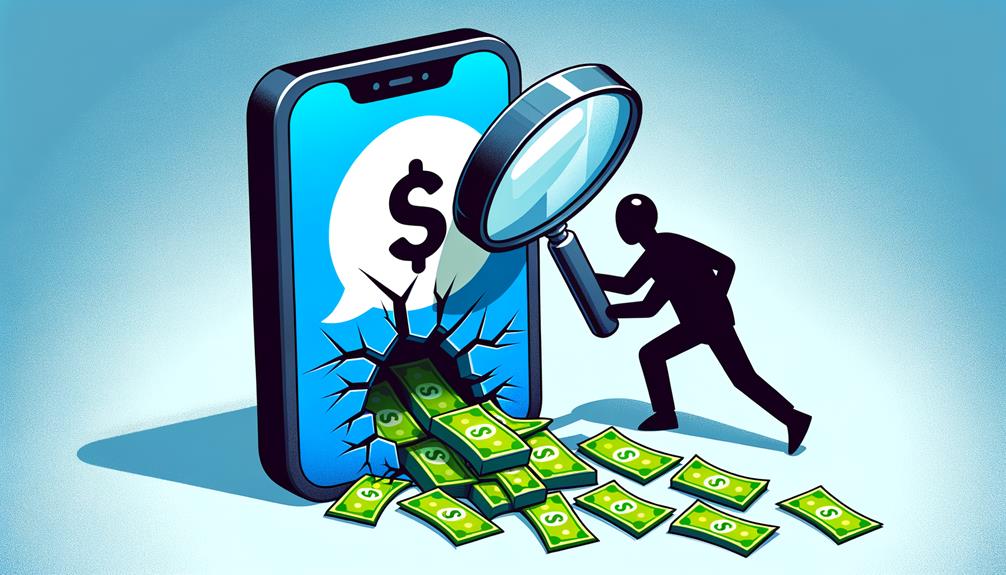Exploring WhatsApp’s Monetization Strategy: The Path Chosen
Navigating the choppy waters of monetization, WhatsApp has found itself stuck between the devil and the deep blue sea. It’s a tightrope walk, balancing the need for revenue generation while maintaining user trust and privacy.
How can WhatsApp monetize without alienating its massive user base or compromising data privacy? Is there a middle ground, or will it succumb to the pressure of its competitors?
This discussion unravels the intricate knot that is WhatsApp’s monetization dilemma, beckoning you further into the labyrinth of this digital conundrum.
Key Takeaways
- WhatsApp’s monetization efforts include a business service and potential ads, despite initial resistance to heavy monetization.
- The acquisition by Facebook introduced data integration, raising privacy concerns and questions about weakening encryption.
- Despite low revenue, investors saw potential in WhatsApp’s large user base, indicative of its network effect and user loyalty.
- The clash between WhatsApp founders and Facebook over monetization and data collection highlights the trade-off between privacy and free services.
WhatsApp’s Initial Monetization Strategy
In its early stages, WhatsApp adopted a simplistic monetization approach, levying a nominal $1 fee from some users but largely refrained from aggressive revenue generation, a strategy that sparked both intrigue and skepticism among investors.
The limited monetization strategies implemented by WhatsApp posed significant revenue challenges. The app’s steadfast focus on user experience over profits was both an asset and a liability.
It won the platform rave reviews and millions of users, but it also raised questions about its long-term sustainability and profitability.
The company’s reluctance to introduce ads or sell user data, which is a common practice among other tech firms, further intensified these revenue challenges.
Investors were left speculating about the company’s ability to convert its rapidly growing user base into a steady cash flow. This fundamental dilemma defined WhatsApp’s early monetization journey.
Facebook’s Acquisition of WhatsApp
Seeing a goldmine in WhatsApp’s massive user base and potential for data integration, Facebook shelled out a staggering $19 billion to acquire the messaging giant, a move that sparked a wave of controversy and criticism.
Facebook’s strategy was clear: leverage WhatsApp’s user data to bolster its advertisement model while eliminating a potential competitor.
However, the acquisition was not without challenges. The table below depicts some of them:
| Challenge | Description |
|---|---|
| Privacy Concerns | Users were skeptical about Facebook’s handling of their data |
| Regulatory Scrutiny | Facebook faced fines from the European Commission for misleading information |
| Internal Conflicts | Disagreements arose between Facebook and WhatsApp regarding data privacy and monetization |
Despite these hurdles, Facebook continues to navigate the complex landscape, aiming to monetize WhatsApp while maintaining user trust.
Current Revenue Streams
Despite its massive user base, WhatsApp has often struggled to establish consistent revenue streams.
- WhatsApp Business: This service, launched in 2018, is a significant revenue source for the platform. It allows businesses to communicate directly with customers, providing a platform for customer service and marketing.
- Advertising Revenue: Although WhatsApp remains ad-free, there are plans to introduce ads in the Status feature. This could potentially open up a major revenue stream.
- Subscription Fees: Initially, WhatsApp charged a nominal annual subscription fee, but this was discontinued in 2016.
- Data Integration: Following its acquisition by Facebook, WhatsApp’s user data has potential for monetization, although this has been controversial due to privacy concerns.
The challenge for WhatsApp is balancing monetization with user experience and privacy.
Also Read – Revealing the Awful Secrets of Bytedance’s Dark Empire on Tiktok
The Pressure to Monetize
Balancing user experience and privacy while exploring ways to monetize has put WhatsApp in a tough spot. The pressure to generate income from its massive user base has led to serious challenges for the messaging giant.
Initially, WhatsApp resisted traditional monetizing routes, prioritizing user experience over revenue. However, after its acquisition by Facebook, the need for profitability became more pressing.
Proposed solutions, such as introducing ads within the app’s status feature, have met with backlash from users valuing an ad-free experience.
The dilemma deepens as WhatsApp grapples with maintaining user trust while seeking viable revenue streams.
Amidst rising competition and increasing privacy concerns, WhatsApp’s journey towards monetization is fraught with difficulty, illustrating the challenges tech companies face in the digital era.
Privacy Concerns: A Closer Look

As WhatsApp navigates its monetization journey, it concurrently battles significant backlash over privacy concerns, particularly regarding data sharing with its parent company, Facebook. This issue has led to several developments:
- Data Encryption: WhatsApp’s end-to-end encryption promises secure communication; however, the proposed data integration with Facebook raised questions about this security level.
- User Trust: Users’ trust in WhatsApp has been shaken, making them consider alternatives like Signal and Telegram, which emphasize data privacy.
- Regulatory Scrutiny: WhatsApp’s data sharing practices have drawn global regulatory scrutiny, with penalties such as the hefty fine by the European Commission.
- Transparency: WhatsApp is under pressure to provide more transparency about its data practices, making it a crucial factor in regaining user trust and navigating its monetization dilemma successfully.
WhatsApp and Data Collection
In the realm of data collection, WhatsApp’s practices have sparked considerable controversy, especially when it comes to the sharing of user information with its parent company, Facebook.
Users feel uneasy about their data security, as instances of unauthorized data access have shattered user trust.
WhatsApp’s end-to-end encryption promises secure communication, yet questions arise over metadata collection. Metadata, though not revealing message content, exposes patterns that can be quite revealing.
WhatsApp collects data such as user phone numbers, contacts, and frequency of app usage. This collection is a trade-off for a free service, but users question whether it’s worth it.
Transparency in data collection practices is a pressing issue, and the balance between data security and monetization remains WhatsApp’s looming challenge.
The Impact of Competition

Amid the rising privacy concerns, competition in the messaging app market has heated up, reshaping the market dynamics and forcing WhatsApp to reassess its strategies.
The introduction of privacy-centric apps like Signal and Telegram has pushed WhatsApp to rethink its data collection policies and user preferences.
Also Read – How Marcus Samuel Built The Biggest Oil Company In The World!
- Market dynamics: The increase in competition has shifted user preferences towards apps offering stricter privacy controls.
- User preferences: Users are making conscious choices, preferring apps that respect their privacy.
- Privacy implications: The competition has prompted WhatsApp to revisit its privacy policies, impacting user behavior.
- User behavior: Users are becoming more aware of privacy implications and are willing to switch apps for better privacy controls.
Thus, competition significantly affects WhatsApp’s monetization strategies.
User Loyalty to WhatsApp
Despite the increased competition and heightened privacy concerns, WhatsApp manages to retain a sizable user base, showcasing its strong user loyalty.
The platform’s user engagement is high, with customers appreciating its simplicity, reliability, and data security features. Many users have integrated WhatsApp deeply into their personal and professional lives, making it difficult to switch to alternatives.
The table below further highlights WhatsApp’s strengths:
| Strengths | Description |
|---|---|
| User Engagement | WhatsApp’s interface promotes easy communication, leading to high user activity. |
| Data Security | End-to-end encryption ensures messages are only visible to the sender and receiver. |
| User Loyalty | Despite controversies, users stick with WhatsApp due to its convenience and wide user base. |
| Deep Integration | For many, WhatsApp is a daily necessity for both personal and professional communication. |
These factors contribute to WhatsApp’s resilience amidst challenges.
Understanding Messaging App Alternatives

To navigate the labyrinth of messaging app alternatives, it’s essential to grasp the strengths and weaknesses of each platform, especially in terms of privacy and functionality.
- Signal: Known for its robust security, Signal offers end-to-end encryption by default, ensuring user privacy is a priority. It has an open-source protocol, allowing for transparency and scrutiny of its security mechanisms.
- Telegram: While Telegram’s encryption is lauded, it’s not enabled by default, leaving room for potential security breaches. It uniquely offers the option for self-destructing messages, enhancing user control over their data.
- WhatsApp: Despite privacy concerns, its widespread usage, ease of use, and additional features like voice and video calls make it a popular choice.
- Viber: Boasting military-grade security and self-destructing messages, Viber offers a good balance of privacy and functionality.
Deciding on an app depends on the user’s preference for privacy, functionality, and the user base of each platform.
Critiques of Facebook’s Acquisition
Facebook’s acquisition of WhatsApp sparked widespread criticism, primarily due to the staggering $19 billion price tag that far exceeded the messaging app’s revenue at the time.
Acquisition critiques argue that Facebook’s strategy wasn’t financially sound, and the astronomical sum was unjustified.
However, Facebook saw strategic value in WhatsApp’s vast user base and potential for data integration. Critics also questioned Facebook’s true intentions, fearing it aimed to monopolize the social media market, thereby stifling competition.
Furthermore, concerns arose about data privacy, as Facebook’s track record in that area was far from spotless. The integration of WhatsApp’s data with Facebook’s could potentially compromise user privacy, raising further questions about the real cost of this acquisition for users.
Increasing User Awareness

In the whirlwind of acquisitions and privacy concerns, it’s essential for users to increase their awareness about how platforms like WhatsApp and Facebook utilize and share their data.
These tech giants have often been criticized for their opaque data practices, and user education is paramount in this digital age.
To foster increasing awareness, users must:
- Understand the data policies of each platform.
- Stay updated on changes to these policies.
- Be aware of alternatives that prioritize privacy, like Signal.
- Actively engage in discussions and share insights about data privacy.
These steps can help users navigate the intricate web of data policies and retain control over their personal information while enjoying the benefits of these platforms.
Trade-Offs: Privacy Vs Free Services
Navigating the digital landscape often presents a significant conundrum: users must weigh the convenience of free services like WhatsApp against the potential erosion of their data privacy.
The trade-off presents a dilemma; while WhatsApp offers an easy-to-use, free messaging service, privacy implications remain a concern. The choice rests with the user, who must decide what value they place on their personal data.
| Free Services | Privacy Implications | User Choice |
|---|---|---|
| WhatsApp’s convenience | Data sharing with Facebook | Weighing up the trade-offs |
| No direct monetary cost | Potential weakening of encryption | Choosing to accept terms |
| Deeply embedded in social life | Transparency concerns | Option of using alternatives |
| Network effect | Data used for monetization | Decision on connectivity vs privacy |
| Business and personal use | Fine for misleading information | Awareness of rights and implications |
The dilemma embodies the wider issue of privacy versus free services in the digital age.
Frequently Asked Questions
How Did the Acquisition of Whatsapp Fit Into Facebook’s Broader Business Strategy?
Facebook’s acquisition of WhatsApp was a strategic move. They aimed to integrate WhatsApp’s vast user data into their existing network, enhancing their monetization efforts. This fit into Facebook’s broader business strategy of data-driven revenue generation.
However, they’ve faced challenges, particularly concerning user privacy and resulting regulatory scrutiny. Ultimately, it’s a tightrope walk between profitability and maintaining user trust.
What Are the Key Differences Between Whatsapp’s Initial Monetization Strategy and Its Current Revenue Streams?
Ironically, WhatsApp’s initial monetization strategy was a modest subscription model. They’ve since abandoned it, embracing Facebook’s lust for advertising revenue.
Their current strategy includes the WhatsApp Business service and looming plans for ads. In stark contrast to their humble beginnings, they’re now under pressure to exploit their vast user base for profit.
It’s quite a shift, from simple subscriptions to complex advertising strategies, and it’s quite the tech-savvy conundrum.
How Has the Pressure to Monetize Influenced Whatsapp’s Decisions Regarding Data Collection and Privacy?
The pressure to monetize has heavily influenced WhatsApp’s decisions on data collection and privacy. They’ve tweaked their monetization methods, pushing towards data sharing with Facebook, causing privacy concerns.
This move aims at leveraging user behaviors for ad targeting. However, it’s a delicate balance, as users value both free services and privacy. If WhatsApp pushes too far, they risk losing users to privacy-focused alternatives.
It’s a complex, ongoing dilemma.
How Have Privacy Concerns Impacted User Loyalty to Whatsapp and Their Consideration of Alternative Messaging Apps?
Privacy concerns have indeed impacted user loyalty to WhatsApp. User migration trends suggest a shift towards alternative apps like Signal and Telegram due to perceived better privacy features.
Users are analyzing these alternative app features, valuing data security over network effects. It’s a delicate balance between privacy and connectivity, and presently, privacy seems to be winning the race for many users.
WhatsApp’s monetization pressures may have inadvertently triggered this trend.
How Can Users Become More Aware of the Trade-Offs Between Privacy and Free Services When Using Apps Like Whatsapp?
To enhance their privacy literacy, users must actively seek information about free service implications. They can research how apps like WhatsApp handle personal data and make profit. Online resources, tech blogs, and forums provide insights into these issues.
It’s vital for users to understand that free apps often monetize through data collection. Users should engage in discussions and stay updated on privacy policies, thus making informed choices about the apps they use.
Conclusion
In the ruthless battlefield of digital messaging, WhatsApp grapples with a monstrous monetization conundrum. Tangled in a web of privacy concerns, riveting competition, and insatiable hunger for profit, it’s a titanic struggle in a tiny app.
Yet, amidst the chaos, the clarion call for user awareness reverberates louder. The users, armed with knowledge, are the ultimate game-changers in this high stakes drama, holding the power to shape the future of WhatsApp’s monetization saga.
Share this content:













Post Comment